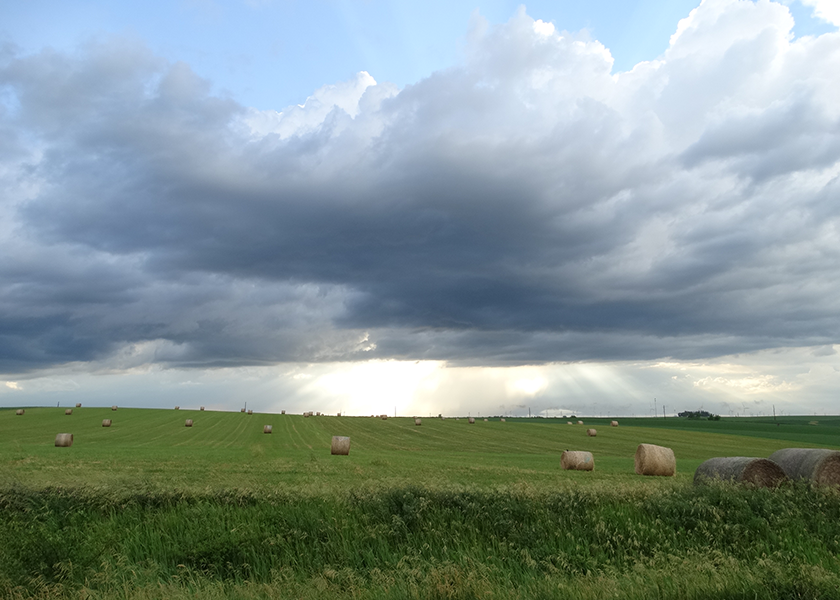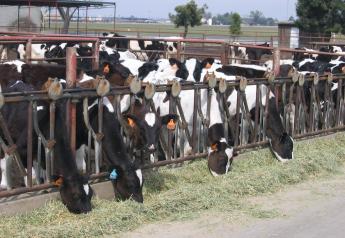Evening Report | October 27, 2023

Check our advice monitor on ProFarmer.com for updates to our marketing plan.
Your Pro Farmer newsletter is now available... It took just over three weeks, but House Republicans finally (and unanimously) approved new Speaker Mike Johnson (R-La.). His first order of business will be trying to get the fragmented Republican party more united. The clock is also ticking on getting another short-term funding measure to keep the government running past the Nov. 17 deadline for the current continuing resolution. Johnson said he wants the full House to debate a new farm bill in December, but a one-year extension of the current farm legislation is gaining momentum – even now from Senate Ag Chair Debbie Stabenow (D-Mich.), who has shifted her stance. Many early tests lie ahead for Johnson and his fellow lawmakers. On the economic front, the Fed is widely expected to pause its interest rate increases following the Oct. 31-Nov. 1 monetary policy meeting. For the first time since 2017, China signed goodwill agreements to buy U.S. ag goods, including soybeans, corn, sorghum and wheat, ahead of an expected meeting between presidents Joe Biden and Xi Jinping in November. There’s also talk China could have washed out some Brazilian bean buys, which could push more near-term business to the United States. In South America, weather during the early stages of the growing season has been very uneven. USDA delivered the most negative Cattle on Feed Report over the past year, signaling supplies won’t be as tight as once expected, though the supply situation remains far from bearish. We cover all of these items and much more in this week’s newsletter, which you can access here.
Cargo ships moving via Ukraine's Black Sea corridor... Four vessels left Ukrainian Black Sea ports in the Odesa region on Friday as shipping via a new export corridor resumed after a three day pause, independent transport sector consultancy STC said. Ukraine President Volodymyr Zelenskyy said exports via the corridor would continue despite threats from Russian warplanes and sea mines in the area.
India extends halt on futures trading in key ag commodities... India on Friday extended the suspension of trading in derivative contracts of key ag commodities into December 2024, as the world’s largest importer of vegetable oils and a major producer of wheat and rice seeks to curb food inflation.
The Securities and Exchange Board of India (SEBI) in 2021 ordered a year-long suspension of futures trading in key ag commodities that was last year extended until Dec. 20, 2023. The order will now last through Dec. 20, 2024, on soybean and its derivatives, crude palm oil, wheat, paddy rice, chickpea, green gram and rapeseed mustard.
House Ag chair still upbeat about farm bill... House Ag Chair Rep. Glenn “GT” Thompson (R-Pa.), in an interview with us on AgriTalk, still thinks a farm bill can be completed this year. “We need to do our job,” he said. His optimism is based in large part on a pledge made by House Speaker Mike Johnson (R-La.) in the run-up to Johnson’s winning the House gavel Wednesday. The new speaker convinced farm bill backers that the five-year bill remains “must pass legislation” for 2023, Thompson said.
When asked about those urging a one-year extension of the 2018 Farm Bill, Thompson said while “a clean extension” may be needed, it should not be for that long.
Responding to reports that USDA prefers a longer-term extension rather than a brief one, Thompson said, “They should do their job.”
Thompson wants the Senate to show him how much additional funding Majority Leader Chuck Schumer (D-N.Y.) has made available to Senate Ag Chair Debbie Stabenow (D-Mich.). “I want to see the budget offsets,” he said. As for prospects for the EATS Act relative to Proposition 12, Thompson said, “it has been demonized” and a likely different approach to the issue is needed.
Meanwhile, House Democrats haven’t decided to back a 2018 Farm Bill extension and remain hopeful of moving a bipartisan farm bill, House Minority Leader Hakeem Jeffries (D-N.Y.) told reporters Thursday. House Republicans “continue to play ideological games” as some tout deep cuts in the next farm bill, Jeffries said, but “at the end of the day, there’s no circumstance where any meaningful piece of legislation is moving through the House of Representatives unless it is bipartisan.”
FarmDoc’s Coppess writes again on reference prices... A FarmDoc article written by Jonathan Coppess concludes: “If recent reports are accurate that the House Agriculture Committee is considering a controversial proposal to reduce conservation, SNAP, and rural development funding by $50 billion to offset the projected costs of increasing reference prices, an extension of the 2018 Farm Bill is likely the least bad option. It may even be worth considering a continuation of the current farm program authorities for another five years rather than gamble away the current farm bill coalition.”
The latest discussion centers around the implications of a reported House Agriculture Committee proposal and the complexities associated with the Congressional Budget Office’s (CBO) scoring of agricultural policies. The proposal in question relates to raising reference prices and its potential impact, both politically and financially. It is estimated that such a change would cost approximately $50 billion over a 10-year period. Coppess writes that this amount is significant in the context of the entire 10-year baseline budget for Title I, which amounts to nearly $66 billion, with a substantial portion allocated to Price Loss Coverage (PLC) from fiscal year (FY) 2024 to FY 2033.
The discussion highlights the challenging political dynamics surrounding this proposal, noting that previous efforts to cut funding for the Supplemental Nutrition Assistance Program (SNAP) nearly derailed the passage of the 2014 and 2018 Farm Bills, resulting in initial defeats on the House floor. The current proposal, if pursued, is seen as potentially more contentious, as it could create divisions between farmers, rural communities, and low-income Americans reliant on SNAP benefits. Furthermore, Coppess writes, it may lead to conflicts among farmers, particularly those vying for conservation funding versus those receiving additional farm program payments.
The conversation delves into the “CBO gamble,” emphasizing the significance of CBO scoring rules. The figures presented illustrate actual crop prices from 2008 to 2022, along with various CBO price projections spanning from 2008 to 2033. The effective reference price calculation introduced in the 2018 Farm Bill is emphasized for its role in helping farmers adapt to price fluctuations and mitigate large spending projections in the years following a farm bill's expiration.
Comments from one farm policy observer: “Coppess has long opposed reference prices on ideological grounds. He advocated altogether omitting PLC in 2014 and providing only ARC with no reference price in it. The result would have been catastrophic for farmers. This commentary is merely an extension of that.”
Another contact notes: “He’s implicitly saying that trimming 3% from the rest of the farm bill to make sure the farm safety net works for farmers is a bridge too far and is grounds for saddling farmers with status quo for another 5 years.”
Core PCE falls to 28-month low... The U.S. personal consumption expenditure (PCE) price index rose 3.4% annually in September, the same as the upwardly revised figure for August. Core PCE, the Fed’s preferred inflation gauge, which excluded food and energy prices eased to 3.7%, the lowest since May 2021.
The Fed is widely expected to keep interest rates unchanged this week and there are now increased odds the monetary tightening cycle could be finished.
U.S. consumer spending stronger than expected in September... U.S. consumer spending increased more than expected in September, keeping it on a higher growth path heading into the fourth quarter. Consumer spending, which accounts for more than two-thirds of U.S. economic activity, surged 0.7% last month, the Commerce Department reported. Consumer spending is being driven by solid wage growth from a tight labor market, as well as households drawing down savings accumulated during the Covid-19 pandemic.
USDA to survey Midwest corn and soybean farmers on cover crops... USDA’s Economic Research Service (ERS) plans to conduct a voluntary survey of corn and soybean farmers in the Midwest to study farmers’ preferences for participating in programs that support cover cropping and gather information about current cover cropping practices. USDA is interested in supporting the long-term adoption of climate-smart conservation practices, including cover crops, through technical assistance and financial incentives. The study will focus on federal programs like the Environmental Quality Incentive Program (EQIP) and the Conservation Stewardship Program (CSP). The survey will explore how contract flexibility, ease of application, payments, and other factors influence farmers’ willingness to enroll their fields in cover crop programs. The results will be compared with those of farmers with no history of using cover crops in federal programs and will be used in research publications to provide information to stakeholders and the public regarding farmer preferences for planting cover crops and participating in related programs. Comments on the survey are due by Dec. 26.
CRP can’t offer new contracts... The expiration of some provisions of the 2018 Farm Bill on Oct. 1 has stranded the Conservation Reserve Program (CRP). USDA cannot offer new contracts, revise existing contracts or process applications to enroll cropland in the reserve.






